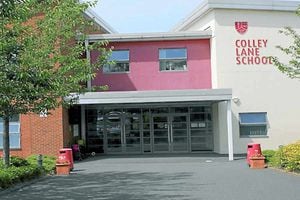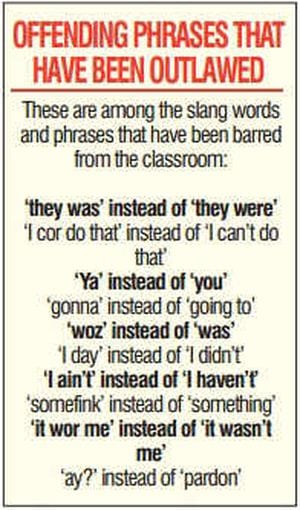Halesowen school tells pupils they gorra drap Black Country 'slanguage'
Yow cor spaek lyuke that kids - that's the message from a Black Country school that is encouraging children to drop their 'slanguage' in the class and speak proper English.

No longer will the corridors of one school ring with the dulcet tones of slang words 'gonna', 'woz' or 'it wor me' under the radical moves to get its pupils speaking properly.
Colley Lane Primary School, in Halesowen, has issued a 'Mind Your Slanguage' guide for parents setting out what the children can and cannot say in class.
It includes ideas for parents to help their children including laying family games, reading books aloud together and avoiding 'text talk'.
And it features a list of the top 10 most 'damaging phrases' used by children in the class, which are now banned.
Should Black Country slang be banned in the classroom? Vote in our poll below and have your say in the comments section:
Headteacher John White said the move was in response to a decline in standards of English for children entering the school.
He said: "I think we are seeing a decline in standards of English when children come into school.
"We are seeing that some children coming in are not able to speak very much at all to be honest.

"I think some of the changes in society – the amount of time people sit around and talk together and the amount of screen time – seem to be having an effect on how confidently children speak when starting school.
"We want to pick them up on that and improve their standards in English. It is important because it is the foundation of everything.
"If they can't say it, it is likely they can't read it, and even less likely they can write it."
Mr White said the new rules were only in the classroom, and children were not to be discouraged from using their local dialect slang in the playground.
He said he recognised the importance of maintaining the area's culture.
He said: "We value the dialect but we want to encourage children to learn when to use and when not, like for a job interview. It is, of course, fine to use in other situations and we would celebrate that."He added: "We know it is a topic lots of people will be interested in, but I'm positive about it.
"If it starts to get people talking about the issue, that can only be a good thing."
He added that the moves were not intended to 'patronise' the local dialect, but to improve levels of English in a bid to help pupils succeed in school. It is about setting them up to succeed, they have to go out there and compete and we don't want them to disadvantaged in any way."
The move has been met with a mixed reaction from parents.
Ann Mills, aged 62, of Station Road in Old Hill, has two grandchildren at the school - a nine-year-old girl and seven-year-old boy.
She said: "I think in one way for the school it is a good idea, but at the same time it is about where these children live.
"You are going to speak the local dialect.
"I think we should be accepted for who we are. I was raised here and I'm proud of the way we speak."
However, parent Zheyan Kareem, who has a seven-year-old boy at the school and moved to the UK eight years ago, said she thought it was a good move by the school.
The 31-year-old said: "English is my second language so for me, as a parent, it is good if my child speaks English in the house and not slang picked up at school.
"I believe it is good for their education."
Professor Carl Chinn has also joined in the debate over school idea. He said there should be 'no conflict' between dialect and standard English.
He said: "I think children should be taught to read, write and speak in standard English but there should not be any attempt to eliminate the dialect.
"Dialect and standard English should complement one another there should be no conflict between them.





